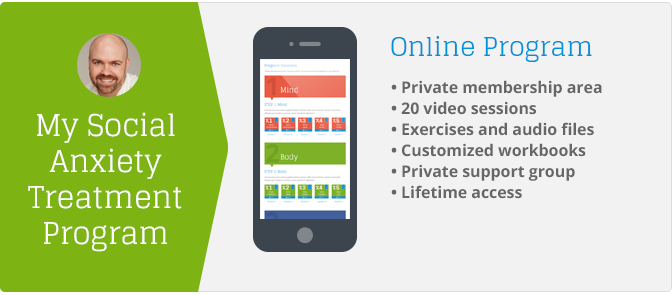Panic Attacks and Social Anxiety Disorder

Among all the automatic responses our bodies have to stress, panic attacks are certainly one of the most difficult to deal with. If you suffer from social anxiety, it is an additional challenge: you may not only worry about a situation itself, but also about your anxiety spiralling out of control in a very public way, drawing attention to you.
What are the symptoms of panic attacks?
Panic attacks can be extremely frightening to those experiencing them and witnessing them, as, to the untrained eye, they very much look like you are having a heart attack. The onset is often quite sudden, sometimes without apparent cause, and its most intense phase can last 5 to 20 minutes, although they can continue for several hours. I have witnessed first hand clients having a panic attack right before my eyes, and it is certainly a scary thing to witness.
Chest pain, palpitations and/or shortness of breath are often reported, as well as elevated heart rate. It can lead to hyperventilation, making the level of carbon dioxide in your body drop and leading to dizziness and a feeling of disassociation with reality. They can also be accompanied by sweating, nausea, pins and needles as well as feeling that you are unable to breathe properly. This last symptom was what I distinctly remember witnessing; my client struggling to breathe.
Here are 13 common symptoms that people experience with a panic attack:

1. Heart palpitations, and/or a fast, pounding heart rate
2. Feeling of choking
3. Shortness of breath
4. Trembling or shaking
5. Sweating
6. Chest pain or discomfort
7. Nausea or abdominal discomfort
8. Feelings of dizziness, unsteady, light-headed or faint
9. Fear of losing control or going insane
10. Fear or sense of death
11. Numbness or tingling sensations (paresthesias)
12. Hot flashes or chills
13. De-realization (feelings of unreality) or de-personalization (being detached from oneself)
Why do people have panic attacks?
Some research suggests panic attacks can have biological and genetic roots. They can be caused or worsened by certain medications and addictions and they mostly come from stress and anxiety. Our bodies are very resilient, but if you are experiencing a sudden life change, or have been in a long-term situation which has been causing you continuous distress, your body can reach a point where it can no longer cope and starts overreacting to the slightest stimulus.
Of course, if you are affected by social anxiety disorder, and feeling anxious is part of your everyday life, it can sometimes feel that you are caught in a vicious circle.
What is the difference between panic attack and social anxiety?
Panic attacks and social anxiety are often mistaken for each other, even by professionals, as they present similar symptoms. In both cases, people will tend to avoid social occasions, human interactions, etc… But the reason for this behavior is fundamentally different.
If you have social anxiety, then you may be avoiding social occasions for fear of being judged. However, if you have panic disorder, then it is more likely that you believe that your panic attacks come from an underlying physical illness, and that you are afraid of experiencing one in unfamiliar surroundings and not being able to receive proper care for example.
How can you overcome panic attacks?
A common advice is to reduce caffeine intake, and some medications can also help relieve the symptoms, but when panic attacks are linked to social anxiety, the causes go much deeper, and for real long-term improvement, therapy has proved the most effective treatment. Behavioral therapies such as DBT are particularly successful at helping people identify their triggers and learn new ways to manage their anxiety.
Do any of these symptoms sound familiar and you or someone you know? I’d love to hear from you.
All the best, Kyle


